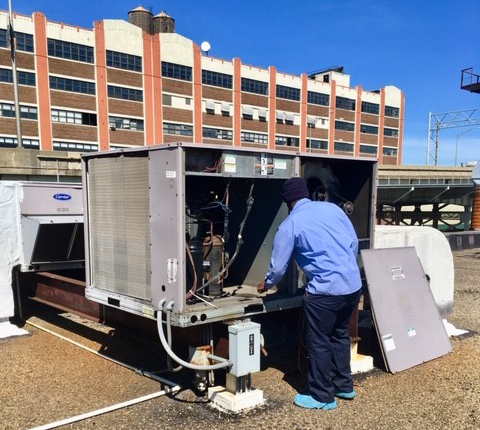Updated October 28, 2024
By John Caloritis
Cooling water filtration is an invaluable tool for building owners looking to maintain efficient operations and protect their water systems. Applied correctly and consistently, filtration enhances the conventional preventative maintenance (PM) chemical treatment programs. While chemical treatments control dissolved solids, microbial fouling, and corrosion, filtration targets the often-overlooked issue of suspended solids, which can cause significant damage if not addressed.
What Are Suspended Solids and Why Are They a Problem?
Suspended solids are tiny particles that remain in water and can contribute to major issues such as accelerated corrosion or erosion, heavy fouling of transmission lines or heat exchangers, and, most notably, support the development of disease-bearing organisms like Legionella.
How Do Suspended Solids Enter Cooling Tower Systems?
Suspended solids typically enter tower systems through the adjacent air stream as water and air mix during the heat rejection process. Towers act like “air washers,” pulling in particulates from the surrounding environment such as pollution, dust, or debris from nearby parking lots, roads, and fields.
Other sources include:
- Unchecked microorganisms that develop into dangerous biofilms
- Unresolved corrosion problems that convert materials like iron or copper into suspended particles
- Excessive chemical treatment where oversaturation causes certain chemicals to become suspended
Can Chemical Treatments Handle All Water Quality Problems?
While chemical treatments are effective at managing dissolved solids, microbial fouling, and corrosion, they don’t fully address the issues caused by suspended solids. In relatively clean systems, chemical treatments may suffice, but in most cases, bleed-off and treatment alone are not enough. This is where filtration becomes a smart, additional layer of protection.
What Types of Filters Are Used for Cooling Water Filtration?
Several types of filters can be used to manage suspended particles, including:
- Sand filters
- Separators
- Bag filters
- Cartridge filters
These filters can be installed along with secondary circulation pumps and strategically piped into the system for optimal filtration performance.
What Are the Benefits of Cooling Water Filtration?
The primary benefit of filtration is reducing the potential for water system fouling, which ensures more reliable performance. Other benefits include:
- Reduced biocide demand: Fewer suspended particles can reduce the need for harsh chemicals.
- Lower tower cleaning costs: Cleaning can be completed more quickly and with less effort.
- Improved bacteria control: Filters help prevent the buildup of bacteria by removing particulates that can support their growth.
- Continuous circulation: Strategic piping can maintain constant water movement, even when loads vary, reducing the chance of fouling.
- Sweeping of pans: Filtration systems can sweep the pans continuously to keep them clear of debris, further minimizing fouling risks.
Why Should Building Owners Consider Water Filtration Systems?
For building owners, investing in cooling water filtration is a smart move to improve system efficiency, reduce maintenance costs, and ensure better control over bacteria and fouling. By keeping the water clean and moving, filtration systems enhance protection for critical cooling infrastructure and help extend the life of equipment. Wherever warranted, building owners should consider incorporating water filters into their overall maintenance strategy.
Why Partner with Water Treatment Experts at Metro Group?
Metro Group has been a trusted source of building solutions since 1925. Our team will evaluate your current water treatment program and identify how filtration can enhance your system’s performance. By working with our water treatment professionals, you’ll find the best filtration solution tailored to your specific needs.
Protect your building, reduce long-term costs, and ensure efficient operations by making filtration a priority in your maintenance strategy. Contact us today for a free evaluation and quote on a water filtration system for your building.


